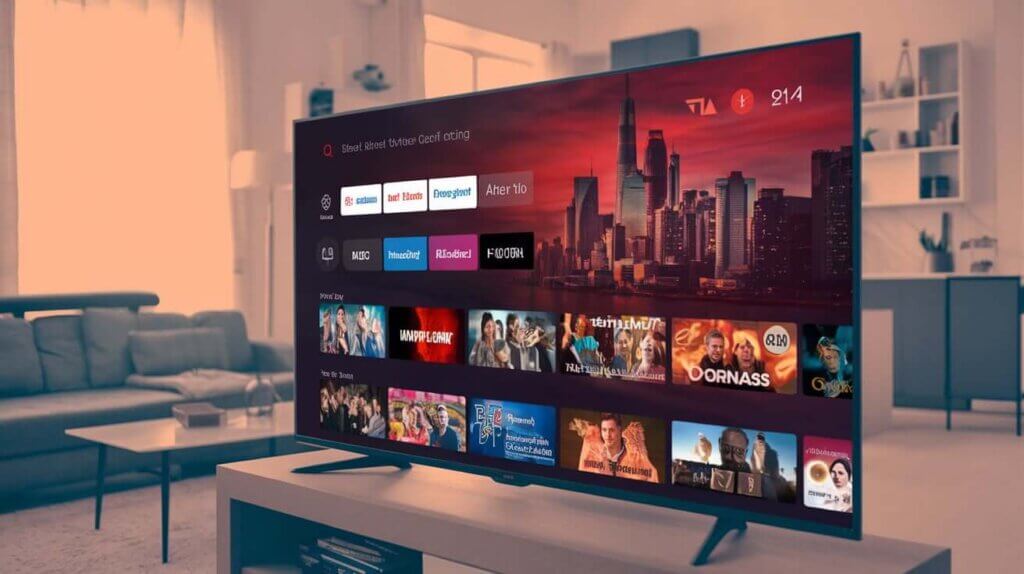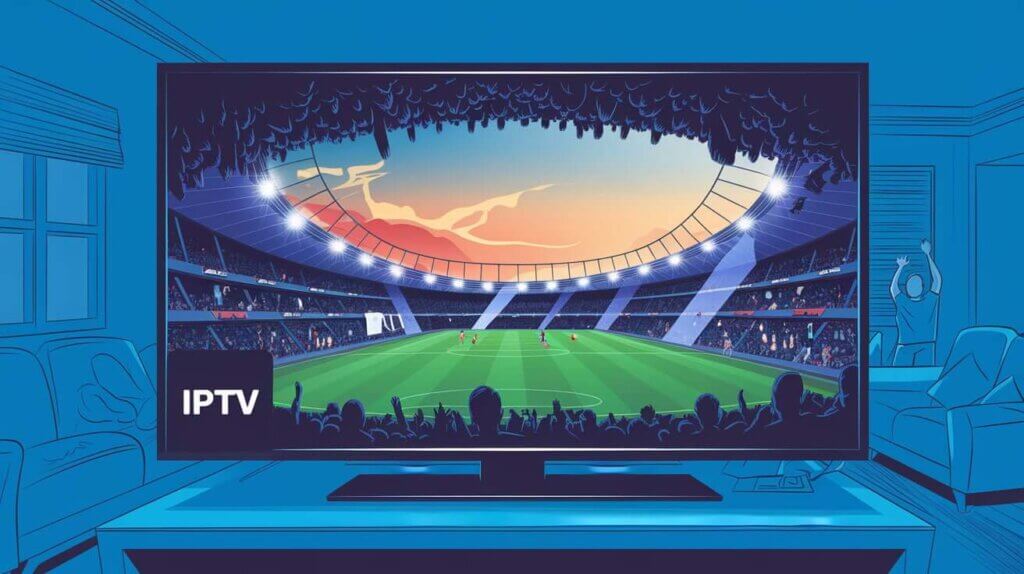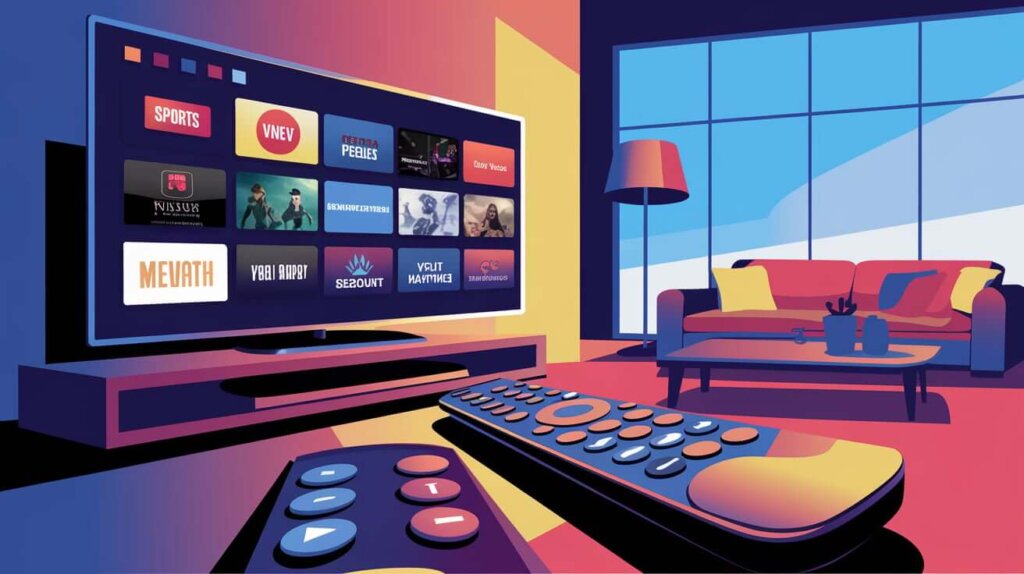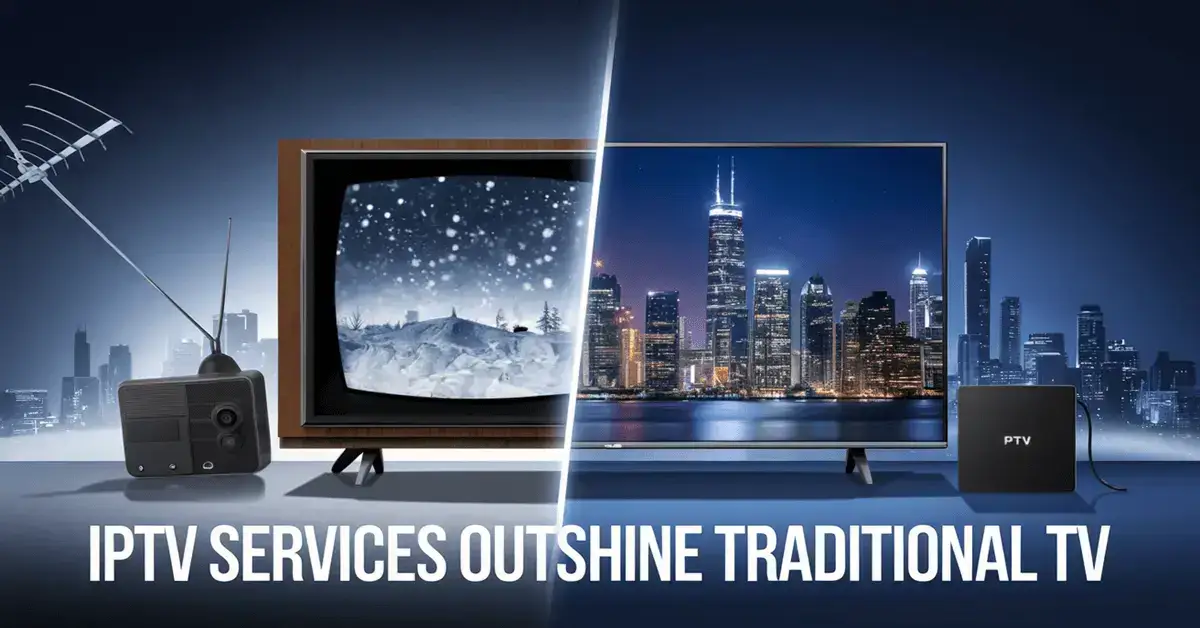Table of Contents
What Is an IPTV Service?

Internet Protocol Television (IPTV) is a modern way to access and stream content using an internet connection instead of traditional broadcast methods like cable or satellite. IPTV delivers content via the internet, enabling a more flexible and customized viewing experience. Unlike traditional TV, which depends on scheduled programming and predefined channels, IPTV offers on-demand access to a vast library of content.
How IPTV Works
- Content is transmitted using Internet Protocol (IP) rather than coaxial cables.
- They provide a seamless experience across multiple devices, including smartphones, smart TVs, laptops, and tablets.
Popular platforms like YouTube TV, Sling TV, and Hulu + Live TV exemplify IPTV’s versatility and range.
IPTV and Its Impact on Traditional TV
The shift from traditional TV to IPTV is not just about technology—it reflects a change in consumer behavior. As more people opt for flexible, on-demand options, traditional broadcasters are feeling the pressure to adapt. This has led to a broader discussion about the future of entertainment delivery.
For more detailed insights into IPTV technology, explore this comprehensive guide.
Recommended resources:
The Rise of IPTV Services: Why Are They So Popular?
They are growing exponentially due to their adaptability to modern lifestyles. Here are the key factors fueling this growth:
Flexibility
IPTV allows viewers to watch their favorite shows and movies anytime, anywhere. Whether commuting to work or relaxing at home, IPTV services offer unmatched convenience.
Customization
Tailor your subscription to your needs. Unlike traditional TV, IPTV users can select specific channels or packages, avoiding unnecessary costs associated with fixed bundles.
Diverse Content
With IPTV, the world of entertainment is at your fingertips. Users can explore international channels, niche genres, and exclusive content, all on one platform.
Market Trends
According to Statista, the global IPTV market size is expected to surpass $100 billion by 2025, demonstrating its increasing adoption worldwide. This growth is driven by advancements in internet infrastructure and the rising demand for personalized content.
Case Study: Success of IPTV in Emerging Markets
Emerging economies, where traditional cable infrastructure is limited, have seen significant adoption of IPTV services. For example, regions in Southeast Asia are embracing IPTV as a cost-effective alternative to satellite TV.
7 Bold Comparisons Between IPTV Services and Traditional TV

Accessibility and Convenience
- IPTV Advantage: Stream content on multiple devices, including smartphones, tablets, and smart TVs. IPTV apps provide access to content anywhere with an internet connection.
- Traditional TV Drawback: Limited to TV sets connected to cable or satellite. Viewers must adhere to rigid schedules, making traditional TV less practical for on-the-go lifestyles.
Content Variety
- IPTV Advantage: IPTV platforms offer vast libraries of on-demand movies, series, and live channels from around the world. Users can explore everything from local news to international sports.
- Traditional TV Drawback: Traditional TV often restricts viewers to regional programming, with limited options for international or niche content.
Cost-Effectiveness
- IPTV Advantage: IPTV services are typically more affordable than cable subscriptions, with transparent pricing and no hidden fees for installation or equipment.
- Traditional TV Drawback: Cable services often charge extra for hardware rentals, HD channels, and premium packages, leading to higher monthly costs.
User-Friendly Interface
- IPTV Advantage: Advanced interfaces allow users to easily search, bookmark, and personalize their viewing experience. Features like pause, rewind, and record are standard.
- Traditional TV Drawback: Clunky interfaces and limited navigation options make traditional TV less appealing to tech-savvy users.
High-Quality Streaming

- IPTV Advantage: IPTV services support HD, 4K, and even 8K streaming, ensuring superior video and audio quality. Adaptive streaming technology minimizes buffering.
- Traditional TV Drawback: Limited to standard resolutions, with occasional signal disruptions in adverse weather conditions.
Ad-Free Experience
- IPTV Advantage: Premium plans often eliminate ads, providing uninterrupted viewing.
- Traditional TV Drawback: Frequent ad breaks disrupt the flow of programs, frustrating viewers.
Flexibility in Subscriptions
- IPTV Advantage: Monthly, yearly, or pay-per-view options give users control over their spending. Cancel or modify plans at any time.
- Traditional TV Drawback: Long-term contracts with cancellation fees limit flexibility.
Common Misconceptions About IPTV Services
Myth 1: IPTV is illegal
Reality: Legitimate IPTV services operate within legal frameworks. It’s essential to research and choose reputable providers to avoid legal issues.
Myth 2: IPTV requires high-speed internet
Reality: While faster speeds enhance streaming quality, many IPTV services are optimized for mid-range internet connections.
Myth 3: IPTV is unreliable
Reality: High-quality IPTV services offer robust infrastructure, ensuring consistent uptime and minimal buffering.
Example: A recent survey found that over 85% of IPTV users reported satisfaction with the reliability of their service providers.
How to Choose the Right IPTV Service
Selecting the ideal It involves evaluating multiple factors:
- Compatibility: Ensure the service is compatible with your preferred devices, such as smart TVs, smartphones, or streaming sticks.
- Content Library: Look for services that offer the channels and genres you enjoy most.
- Customer Support: Reliable customer support is crucial for resolving technical issues.
- Trial Offers: Many IPTV providers offer free trials—use these to evaluate quality before committing.
- Reputation: Research customer reviews on trusted platforms like Trustpilot to gauge reliability and service quality.
Recommended resources:
FAQs About IPTV Services
Q1: What is the difference between IPTV services and streaming platforms?
Streaming platforms like Netflix focus on on-demand content, whereas IPTV combines live TV, on-demand libraries, and interactive features.
Q2: Can IPTV services replace traditional TV completely?
For most users, IPTV offers a comprehensive alternative with more features and flexibility than traditional TV.
Q3: Are IPTV services worth the investment?
Absolutely. They offer superior value through customizable plans, diverse content, and advanced features.
Q4: What equipment is needed to use an IPTV service?
A stable internet connection and a compatible device (e.g., smart TV, smartphone, or laptop) are sufficient to access IPTV services.
Conclusion
This expanded guide provides an in-depth look at why IPTV services are revolutionizing the entertainment industry. Whether you value flexibility, cost savings, or content variety, IPTV is the ideal choice for modern viewers. Start your journey with reliable providers like IPTV Provider VIP today!

